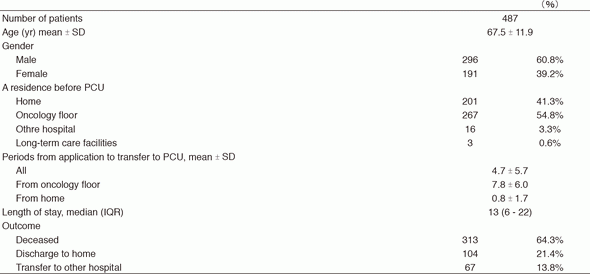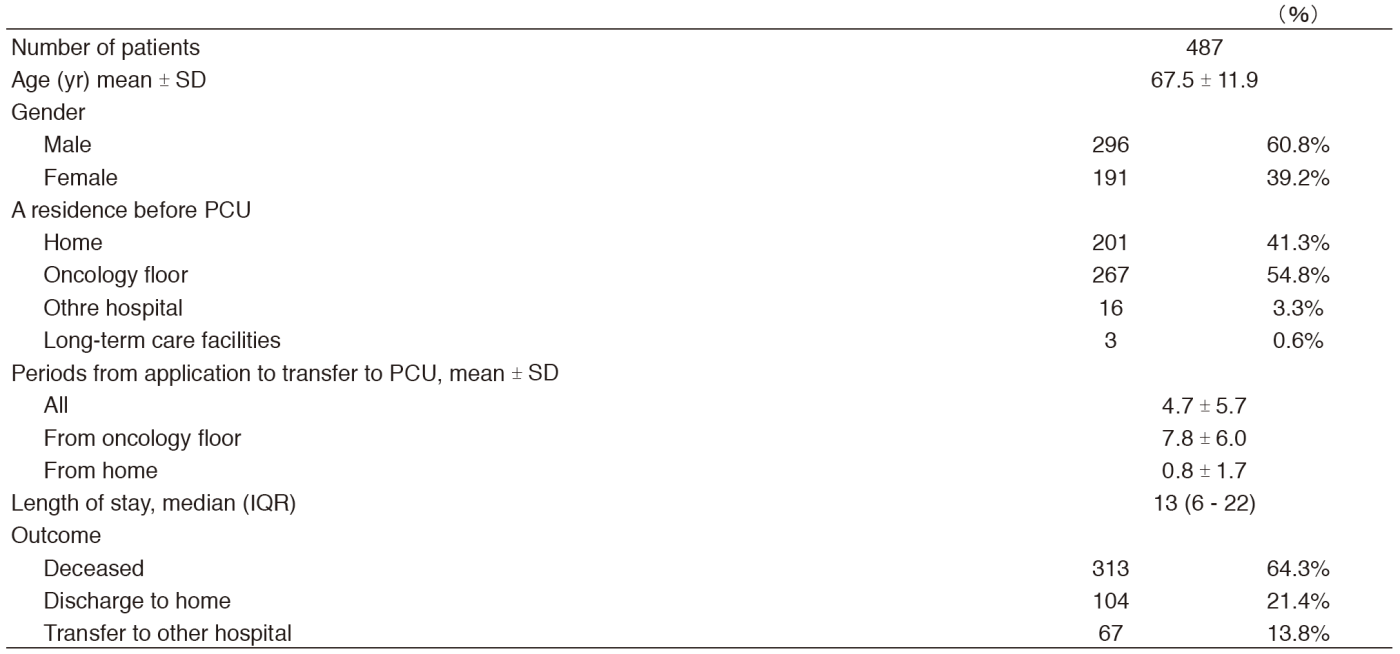HOME > Publication & Reports > Annual Report 2016 > Hospital East
Department of Palliative Medicine
Toshihiko Doi, Hiroya Kinoshita, Yoshihisa Matsumoto, Tomofumi Miura, Keita Tagami, Yuko Uehara, Yuki (Sumazaki) Watababe, Hanako Iwamoto
Introduction
The purpose of our department is to improve the quality of life in cancer patients and their family caregivers by the management of irritable symptom burden and the establishment of a regional palliative care system. Therefore, we provide three palliative care services; 1) outpatient clinic, 2) supportive care team, and 3) palliative care unit.
Our team and what we do
1.Outpatient clinic
Patients with or without anti-cancer therapy consult our outpatient clinic for the management of their devastating symptoms or for support to decide where and how to spend their lives. The concept of early palliative care gradually spread and the consultations of patients undergoing anti-cancer therapy have been increasing (Table 1).
2.Supportive care team
This team consists of a physician, psycho-oncologist, nurse, dietician, physiotherapist, and speech-language-hearing therapist. Our supportive care team performs a multidisciplinary approach for inpatients with various sufferings on the oncology floor.
3.Palliative care unit
Our palliative care unit is a Japanese version of the acute palliative care unit (APCU). The features of the APCU are the multidimensional assessment, rapid symptom control, and intensive psychosocial care with shorter length of stay, and lower death rate than in a traditional PCU. Medical social workers greatly contribute to the transition to palliative home care, and the transfer to other hospital (Table 2).
Research activities
The aim of the research in our division is to establish the regional palliative care system and to integrate the early palliative care with oncology. Researches are conducted as listed below;
1) A system construction of screening and intervention for symptoms in patients with advanced cancer
2) The development of the integration of early palliative care in metastatic lung cancer
3) A survey about pain, fatigue, anorexia, and the development of standard treatment for cancer-related fatigue
4) The registration for Japanese multicenter cohort studies and international multicenter project
Clinical trials
1) A randomized control trial of the integration of early palliative care in metastatic lung cancer (ongoing)
2) A phase II trial of dexamethasone for cancer-related fatigue (under planning)
Education
The purpose is to promote understanding about palliative care for residents. Residents can train in home palliative care on request. To spread the knowledge of primary palliative care, we held several workshops for medical staff in the NCCHE, and for regional palliative care staff.
Future prospects
We will continue to advance our activities, and develop new researches to improve QOL in cancer patients, and their family caregivers.
List of papers published in 2016
Journal
1.Amano K, Maeda I, Morita T, Miura T, Inoue S, Ikenaga M, Matsumoto Y, Baba M, Sekine R, Yamaguchi T, Hirohashi T, Tajima T, Tatara R, Watanabe H, Otani H, Takigawa C, Matsuda Y, Nagaoka H, Mori M, Kinoshita H. Clinical Implications of C-Reactive Protein as a Prognostic Marker in Advanced Cancer Patients in Palliative Care Settings. J Pain Symptom Manage, 51:860-867, 2016
2.Tagami K, Miura T, Suzuki M, Matoba M. Analgesic Effectiveness of Systemic Lidocaine Administration for Abdominal Cancer Pain Caused by Peritoneal Carcinomatosis: A Case Series of 10 Patients. J Palliat Med, 19:1247-1248, 2016
3.Maeda I, Miyashita M, Yamagishi A, Kinoshita H, Shirahige Y, Izumi N, Yamaguchi T, Igarashi M, Kato M, Morita T. Changes in Relatives' Perspectives on Quality of Death, Quality of Care, Pain Relief, and Caregiving Burden Before and After a Region-Based Palliative Care Intervention. J Pain Symptom Manage, 52:637-645, 2016
4.Okuyama T, Kizawa Y, Morita T, Kinoshita H, Uchida M, Shimada A, Naito AS, Akechi T. Current Status of Distress Screening in Designated Cancer Hospitals: A Cross-Sectional Nationwide Survey in Japan. J Natl Compr Canc Netw, 14:1098-1104, 2016
5.Maeda I, Morita T, Yamaguchi T, Inoue S, Ikenaga M, Matsumoto Y, Sekine R, Yamaguchi T, Hirohashi T, Tajima T, Tatara R, Watanabe H, Otani H, Takigawa C, Matsuda Y, Nagaoka H, Mori M, Tei Y, Kikuchi A, Baba M, Kinoshita H. Effect of continuous deep sedation on survival in patients with advanced cancer (J-Proval): a propensity score-weighted analysis of a prospective cohort study. Lancet Oncol, 17:115-122, 2016
6.Matsuo N, Morita T, Matsuda Y, Okamoto K, Matsumoto Y, Kaneishi K, Odagiri T, Sakurai H, Katayama H, Mori I, Yamada H, Watanabe H, Yokoyama T, Yamaguchi T, Nishi T, Shirado A, Hiramoto S, Watanabe T, Kohara H, Shimoyama S, Aruga E, Baba M, Sumita K, Iwase S. Predictors of Responses to Corticosteroids for Cancer-Related Fatigue in Advanced Cancer Patients: A Multicenter, Prospective, Observational Study. J Pain Symptom Manage, 52:64-72, 2016
7.Mori M, Nishi T, Nozato J, Matsumoto Y, Miyamoto S, Kizawa Y, Morita T. Unmet Learning Needs of Physicians in Specialty Training in Palliative Care: A Japanese Nationwide Study. J Palliat Med, 19:1074-1079, 2016
8.Tagami K, Kashiwase Y, Yokoyama A, Nishimura H, Miyano K, Suzuki M, Shiraishi S, Matoba M, Ohe Y, Uezono Y. The atypical antipsychotic, olanzapine, potentiates ghrelin-induced receptor signaling: An in vitro study with cells expressing cloned human growth hormone secretagogue receptor. Neuropeptides, 58:93-101, 2016




